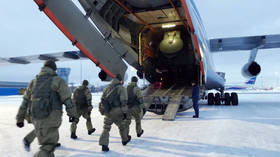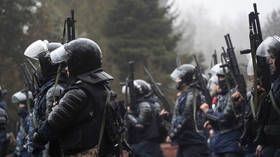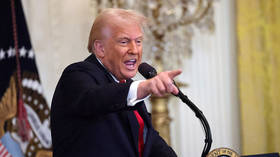Russia-led bloc reveals if peacekeepers will use deadly force in Kazakhstan

The main goal of the peacekeeping mission in Kazakhstan is to help maintain stability and keep strategic facilities well-guarded, the head of a Russian-led security alliance said, as violent unrest continues to sweep the country.
The details of the joint military deployment by the Moscow-based Collective Security Treaty Organization (CSTO) were revealed by the bloc’s Secretary-General Stanislav Zas in an interview with Sputnik on Thursday. The organization brings together six post-Soviet states, including Armenia, Belarus, Kazakhstan, Kyrgyzstan, Russia and Tajikistan.
The peacekeeping mission was launched in full compliance with the CSTO charter, Zas stated, since Kazakhstan’s President Kassym-Jomart Tokayev had requested help in the face of a growing threat to state sovereignty. Following emergency consultations, the allies agreed that the “ongoing events pose a real threat to the country’s security, its stability and even territorial integrity,” Zas said.
Russian and Belarusian advance teams have already arrived in Kazakhstan, and the deployment of 2,500 airborne and special operations forces is expected to be complete by Friday night.
The operation has two primary goals, the secretary-general said, noting that the servicemen will be deployed to guard multiple “important government and strategic facilities,” as well as “help maintain order” and keep residents safe.
Should the sites guarded by the CSTO force come under an armed assault, soldiers will be authorized to use deadly force in response, Zas warned.
In this case weapons will be used. The military personnel of the collective peacekeeping forces have this right.
However, the official stressed that there are no plans to send the peacekeepers to directly confront rioters in Kazakh cities. Law enforcement and policing work will still be conducted solely by Kazakhstan's local forces, he claimed.
“All the allegations that our units will disperse demonstrations and so on – no, this will not happen,” Zas stated. He also dismissed any notion that the mission constitutes an “occupation” or “invasion” as “complete nonsense.”
If [the Kazakh leadership] considers that the situation has stabilized and is controlled by their own forces without the help of our states, then, of course, the operation will end and all the troops will be withdrawn.
The CSTO peacekeepers were called in by Tokayev on Wednesday as Kazakhstan faced a wave of mass unrest, originally triggered by a sharp hike in fuel prices at the start of the new year. The protests grew increasingly violent and political in a matter of days – despite the government’s concessions to protesters’ demands – with multiple locations across the country hit by street violence, arson and rioting.
The country’s largest city, Almaty, has seen the worst of the chaos, as the megapolis has been overrun by rioters, some armed with guns allegedly looted from police armories. Over the last few days, mobs have torched government buildings, ransacked multiple stores, banks and ATMs, and engaged in clashes with police and military forces.














